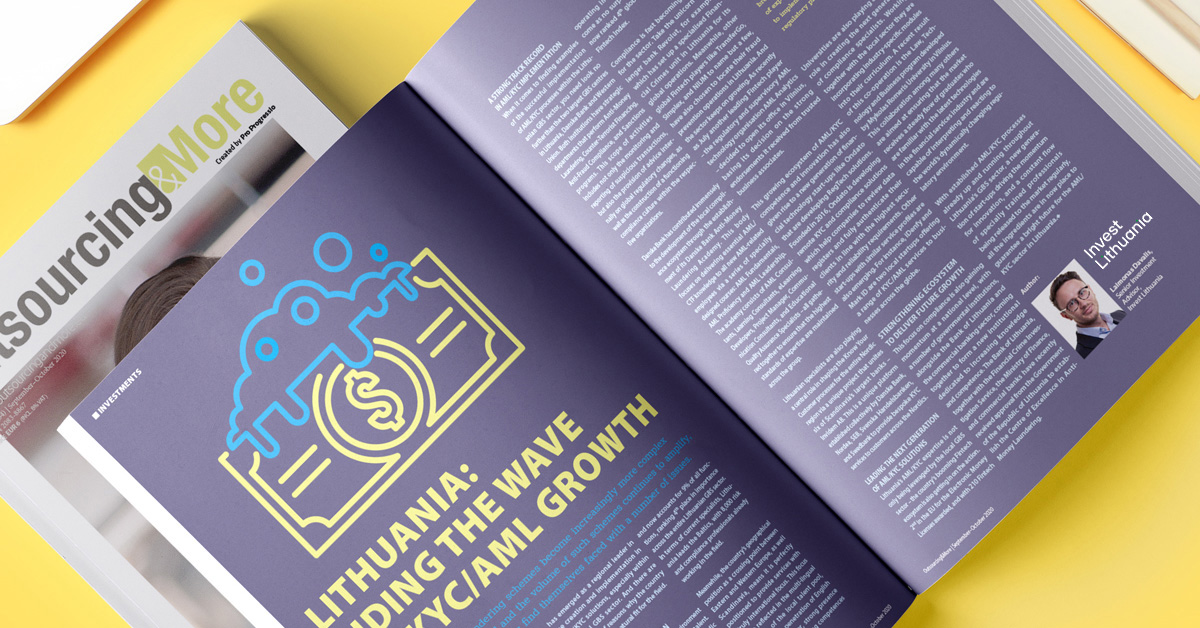The following article by Laimonas Davalis, a Senior Investment Advisor for Business Services and ICT Team at Invest Lithuania first appeared in the Outsourcing&More magazine. You can find the original here.
—
As money laundering schemes become increasingly more complex and sophisticated and the volume of such schemes continues to amplify, financial institutions find themselves faced with a number of issues. Firstly, they need to accurately evaluate and mitigate the risks associated with money laundering. Alongside which, they need to implement processes to ensure they become compliant with the anti-money laundering (AML) regulations imposed by regulatory bodies and governments across the globe. While ultimately, they also face the all too real risk of finding themselves designated a sanctioned entity through allegations of intentional participation in, or unintentional facilitation of money laundering.
In this climate of heightened awareness, the need for effective and easily implementable AML/KYC solutions has skyrocketed. Staking its claim on the global compliance stage, Lithuania has emerged as a regional leader in the creation and implementation in AML/KYC solutions, especially within the local GBS sector. And there are a number of reasons why the country has become a natural fit for the field.
The right talent in the right location
Firstly, Lithuania’s business environment offers an ever-expanding pool of talent. The long-standing presence of Nordic banks and the arrival of Nasdaq and Moody’s in the last decade, has provided the perfect breeding ground for the kind of expertise that is needed to implement complex regulatory processes. Indeed, the importance of compliance processes has been steadily growing in the local GBS sector over recent years, and now accounts for 9% of all functions, ranking 4th place in importance across the entire Lithuanian GBS sector. In terms of current specialists, Lithuania leads the Baltics, with 8000 risk and compliance professionals already working in the field.
Meanwhile, the country’s geographical position as a crossing point between Eastern and Western Europe, as well Scandinavia, means it is perfectly positioned to provide services with a truly international focus. This focus is also reflected in the multi-lingual make-up of the local talent pool, with a 100% penetration of English across the sector, strong presence of German and rising competences of the Nordic languages.
A strong track record in AML/KYC implementation
When it comes to finding examples of the successful implementation of AML/KYC processes within the Lithuanian GBS sector, you need look no further than the two largest GBS centres in Lithuania, Danske Bank and Western Union. Both institutions have strategic departments that perform Anti-Money Laundering, Counter-Terrorist Financing, Anti-Fraud Compliance, and Sanctions programs. This scope of activities includes not only the monitoring and reporting of suspicious transactions, but also the provision of advice internally on global regulatory changes, as well as the construction of a functioning compliance culture within the respective organizations.
Danske Bank has contributed immensely to the development of the local compliance ecosystem through the establishment of its Danske Bank Anti-Money Laundering Academy. This body focuses on delivering essential AML/CTF knowledge to all new AML-related employees via a series of specially designed courses: AML Fundamentals, AML Proficiency and AML Leadership. The academy consists of AML Consultants, Learning Consultants, eLearning Developers, Project Manager, Communication Consultants, and Educational Quality Assurance Specialists – all gathered together to ensure that the highest standards of expertise are maintained across the group.
Lithuanian specialists are also playing a central role in shaping the Know Your Customer processes for the entire Nordic region via a unique project that unites six of Scandinavia’s largest banks – Invidem AB. This is a unique platform established collectively by Danske Bank, Nordea, SEB, Svenska Handelsbanken, and Swedbank to provide bespoke KYC services to customers across the Nordics.
Leading the next generation of AML/KYC solutions
Lithuania’s AML/KYC expertise is not only being leveraged by the local GBS sector – the country’s booming Fintech ecosystem is also getting in on the action. 2nd in the EU for the Electronic Money Licenses awarded, and with 210 Fintech operating in the country, it should come as no surprise that Lithuania is now ranked 4th globally on the Global Fintech Index.
Compliance is fast becoming a focus for the sector. Take the unicorn challenger bank Revolut, for example, which has set up a specialised Financial Crimes unit in Lithuania for its global operations. Meanwhile, other global Fintech players like TransferGo, Simplex, and NIUM to name but a few, have also chosen to locate their fraud prevention operations in Lithuania. And the sector keeps on growing. As recently as July another leading Fintech player – the regulatory and supervisory AML technology organisation AML Analytics – decided to open its office in Vilnius, basing its decision on the strong endorsements it received from trusted business associates.
This growing ecosystem of AML/KYC competence and innovation has also given rise to a new generation of financial technology start-ups like Ondato that are developing RegTech solutions. Founded in 2016, Ondato is developing remote KYC and compliance solutions which help companies to review data registers and fully authenticate their clients in line with the highest security and reliability requirements. Other start-ups with similar service profiles are also emerging. For instance, iDenfy and Mark ID are two local startups offering a range of KYC/AML services to businesses across the globe.
Strengthening ecosystem to deliver future growth
This focus on compliance is also gaining momentum at a national level, with a number of governmental institutions, alongside the Bank of Lithuania and the commercial banking sector, coming together to form a new institutional dedicated to increasing knowledge and competence. The Bank of Lithuania, together with the Financial Crime Investigation Service, the Ministry of Finance, and commercial banks have recently received approval from the Government of the Republic of Lithuania to establish the Centre of Excellence in Anti-Money Laundering.
Universities are also playing a crucial role in creating the next generation of compliance specialists. Working together with the local sector they are incorporating industry-specific modules into their curriculum. A recent result of this co-operation is the Law, Technology and Business program developed by Mykolas Romeris University in Vilnius. This collaboration among many others are aimed at ensuring that the market receives a steady flow of graduates who are familiar with the latest technologies in the financial services industry and are capable of interpreting and reacting to the world’s dynamically changing regulatory environment.
With established AML/KYC processes already up and running throughout Lithuania’s GBS sector, a new generation of start-ups driving the momentum for innovation, and a constant flow of specially trained professionals being released to the market regularly, all the ingredients are in now place to guarantee a bright future for the AML/KYC sector in Lithuania.













